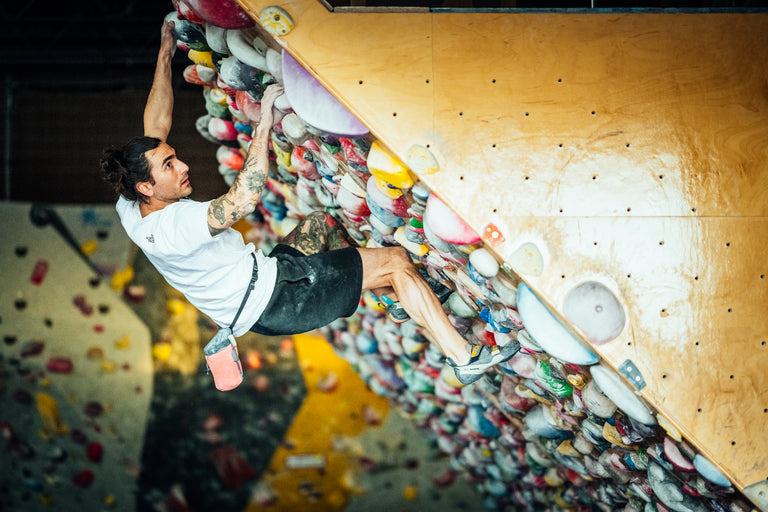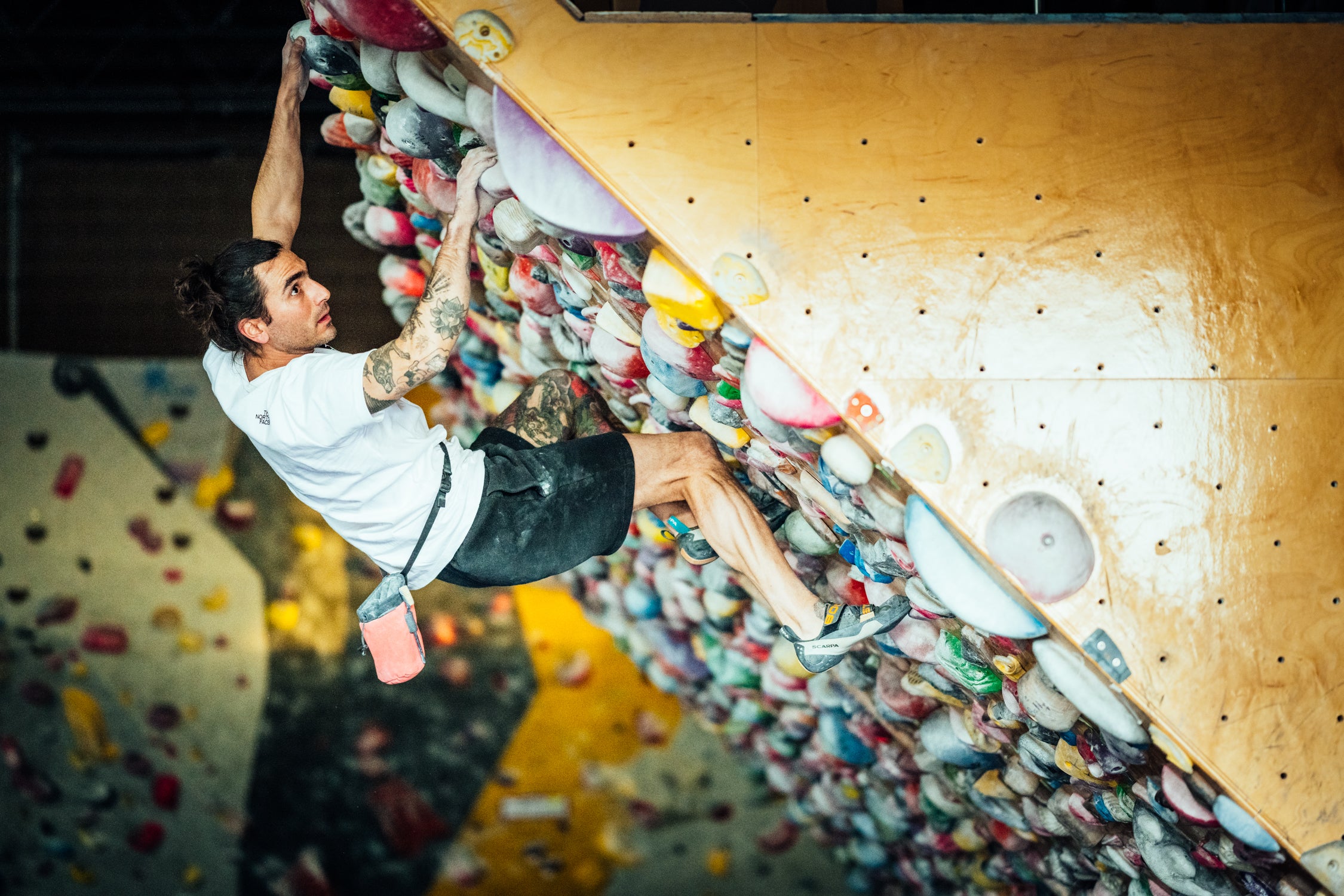Nutrition and climbing go hand-in-hand. In order to feel your best on and off the wall, it’s important to fuel consistently with sufficient calories to meet energy needs. A well-balanced diet also includes carbohydrates, protein, fats and colorful fruits and vegetables. Your diet can adequately supply the nutrients you need to continue climbing for years to come.
But did you know that your climbing may benefit from specific supplements? Whether your goal is to supplement your normal diet (i.e., “fill the gaps”), or you’re looking for an edge in your performance, supplements may be a supportive asset when matched to your goals.
Timing matters
If you are looking to give your climbing an edge, there are a few ergogenic aids, or performance-enhancing supplements, that can effectively support your goals.
Creatine is one of the most studied and effective ergogenic aids available. It works by increasing energy output due to its impact on creatine phosphate stores in muscle. You can read a more detailed explanation in this blog..
Pre-workout is also an effective tool, especially if it contains caffeine. Caffeine increases focus and reduces perception of pain, thereby improving performance.1 Additionally, ingredients, such as beta-alanine and BCAAs support performance by acting as a pH buffer and reducing muscle soreness, respectively.2,3
BCAAs (branched-chain amino acids) on their own are also helpful. Leucine, isoleucine and valine are the three BCAAs and are largely responsible for stimulating muscle protein synthesis. Many studies suggest the ingestion of BCAAs prior to your workout as a preventive method against muscle soreness and enhanced recovery.4
If you are looking for injury prevention or an adjunct tool for injury rehabilitation, collagen is another great supplement you can take before your workout. Collagen peptides in supplement form have been shown to stimulate your body’s own collagen production. It works by supporting connective tissue repair and speeding up recovery (read: Collagen: What You Should Know).5
General supplements for health
Protein powder (like Gnarly Whey or Gnarly Vegan) is quite possibly one of the easiest and most helpful supplements for climbers. As athletes, it is important for us to recover from our training so that we can build muscle and respond better to training. Plus, if you struggle to consume enough protein in your daily diet, a protein powder can help fill that gap. This is especially true for individuals who want to put on muscle, are training twice daily, rehabbing an injury, recovering from an illness/trauma, or consuming a plant-based diet.
Iron is often a concern in plant-based diets or in individuals with iron-deficiency anemia. Your body requires iron for growth, transport of oxygen to the body/muscle, energy production, cognitive function and hormone production. Animal proteins provide the most absorptive form of iron (heme), but you can consume enough iron from a plant-based diet by consuming plentiful whole grains, nuts, seeds, legumes and dark leafy greens. However, a supplement (Gnarly Baseline Iron) may be warranted if you know you are not consuming enough. Consult your doctor for testing.
And finally, a multivitamin is a great tool for filling in dietary gaps. If your diet is limited in diversity, you may be under-consuming some nutrients. The foods we eat contain unique nutrient profiles, which is why it is important to consume a variety of these nutrients from multiple sources. You may also consider a greens powder, which is a powerful tool to support your normal diet. Gnarly Performance Greens acts as a powdered-multivitamin and is a viable option since it contains zero proprietary blends, meaning what is listed on the nutrition panel and ingredients list is exactly what is in the bag.
Who can and should take supplements?
It depends, but most climbers can benefit from a supplement regimen. Whether for general health or performance, climbers of all ages, genders and skill levels can benefit.
Younger athletes should avoid products with caffeine due to the impacts on growth and development.6 Parents and coaches should monitor consumption of supplements. Older athletes would especially benefit from supplementing the diet due to reduced absorption of nutrients..
Athletes taking a prescription medication for a diagnosed condition should consult their doctor before trying a new supplement. For example, new evidence suggests whey protein supplementation may reduce absorption of thyroid medications.7 New data is frequently emerging, and your doctor can guide you to make the healthiest decisions for yourself.
Works cited
- Goldstein, ER, et al. 2010. International society of sports nutrition position stand: Caffeine and performance. Journal of the International Society of Sports Nutrition, 7(5).https://jissn.biomedcentral.com/articles/10.1186/1550-2783-7-5
- Trexler, ET, et al. 2015. International society of sports nutrition position stand: Beta-alanine. Journal of the International Society of Sports Nutrition, 12 (30). https://jissn.biomedcentral.com/articles/10.1186/s12970-015-0090-y
- Howatson, G, et al. 2012. Exercise-induced muscle damage is reduced in resistance-trained males by branched chain amino acids: a randomized, double-blind, placebo-controlled study. Journal Of The International Society Of Sports Nutrition, 9, 20. https://jissn.biomedcentral.com/articles/10.1186/1550-2783-9-20
- Rahimi, MH, et al. 2017. Branched-chain amino acid supplementation and exercise-induced muscle damage in exercise recovery: A meta-analysis of randomized clinical trials. Nutrition, 42, 30–36. https://pubmed.ncbi.nlm.nih.gov/28870476/
- Schunck, M, Oesser, S. (2013). Specific collagen peptides benefit the biosynthesis of matrix molecules of tendons and ligaments. J Int Soc Sports Nutr, 10, P23. https://jissn.biomedcentral.com/articles/10.1186/1550-2783-10-S1-P23
- Duchan, E, et al. 2010. Energy drinks: A review of use and safety for athletes. Phys Sportsmed., 38(2): 171-9. https://pubmed.ncbi.nlm.nih.gov/20631477/





